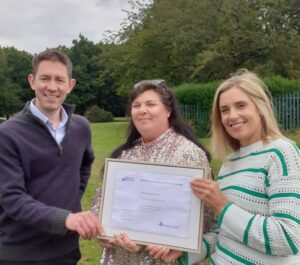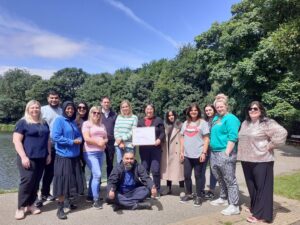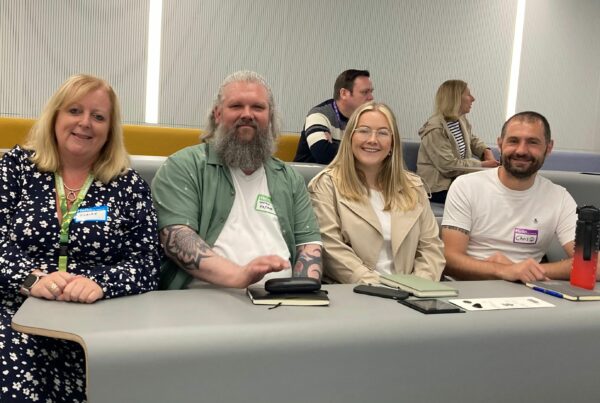
Wellbeing Team Chairs, Mia A Cameron and Abby Goater with TLA’s CEO, Steve Hoey
With pleasure, Leeds Mindful Employer Network announces that the latest winner of the Mindful Employer of the Quarter Award is Turning Lives Around (TLA).
The teams at TLA work to prevent homelessness and empower people to believe that they can change their lives and live independently within sustainable communities.
This business has been awarded the Leeds Mindful Employer Network Member of the Quarter following the anonymous nomination below.
“As a third sector charity, we work within the housing and homelessness sector in West Yorkshire. Our colleagues face daily challenges to their wellbeing due to the nature of their work with vulnerable people with multiple disadvantages. This year we have focused more on wellbeing of our teams and reinvigorated our wellbeing strategy. We have actioned the following, a new employee assistance provider, in house counselling, trauma informed supervision and team wellbeing plans for every team in addition to personal wellbeing plans. We now have a leadership focus on wellbeing, with every leader committed to understanding impact of trauma on our colleagues.”
Mindful Employer Project Coordinator, Leigh Staunton has been speaking to Mia A Cameron, Senior Manager at Turning Lives Around, about their approach to supporting the mental health and wellbeing of employees.
Congratulations to Turning Lives Around on being named Mindful Employer of the Quarter! How does it feel to read the nomination?
Excited. Overwhelmed. Proud to be part of TLA and the Mindful Employer network and so thankful to be surrounded by others with the same values and wellbeing focus. Full of thanks to our teams for the amazing work they do daily with our clients in a trauma informed way and for their care and dedication to homeless people, their colleagues and TLA.
It’s so exciting to see the difference we are making daily and that the hard work of our wellbeing team is being recognised.
Tell us a bit more about you and Turning Lives Around.
Turning Lives Around (TLA) is a third sector charity that began in 1971 and was originally called Leeds Housing Concern (LHC). We have services throughout Wakefield and Leeds supporting vulnerable and homeless people We also are lucky to have a social enterprise scheme Clean Start offering cleaning and hoarding specialist services.
As a charity we have over 14 services with other 150 colleagues. At any one time we can be supporting over 500 vulnerable and homeless people throughout West Yorkshire.
TLA works with people who have a history of Substance misuse ex- offenders, people with care experience and multiple disadvantages and those who have been abused and are either homeless or facing homelessness, single or families with or without pets. But preventing and solving homelessness is more than just a roof over someone’s head. TLA supports people marginalised in society to get back on their feet and lead independent lives.
We do this in a trauma informed way focusing on our clients’ strengths and resilience.
As a homeless organisation not only do we seek the views of our clients and work side by side with them. One of our focuses in on peer support and employing people with lived experience. We aspire to inspire people to believe that change and recovery are possible and that they hold the keys to Turn Their Own Lives Around.
Our Values are:
- Quality and continuous improvement: Delivering high quality services and continually seeking ways to get better at what we do.
- Empowerment: Engendering self-worth, respect and clients directing support
- Aspiration, Recovery and Peer Support: Believing change is possible and valuing and sharing lived experience.
- Inclusion and Diversity: The right of all clients, employees and other stakeholders to be heard.
- Integrity and Respect: Upholding the highest standards of integrity in all our actions and being clear about our purpose and ways of working.
- Co-production: Influencing the strategic direction of national and local homelessness policy and developing and delivering services in collaboration with all stakeholders.
- Innovation: Bold, creative thinking in the development and provision of support
Professionalism, Leadership and Learning: Leading the field in best practice and standards.
Why is staff wellbeing and mental health a priority at Turning Lives Around?
Our roles are primarily supporting clients with multiple disadvantages and multiple support needs and as such our staff are often on the front line when people are in crisis, in pain and at a difficult time in their lives. Although we are also witness to people’s recovery, joy and success in life, we have to acknowledge that our roles can be stressful, and we are at at risk of vicarious and secondary trauma.
As a Trauma informed organisation, we recognise that our colleagues are people before practitioners with their own issues and difficulties and we aim to support them in the best way we can with personal and professional issues.
We care about our colleagues, and we have a duty to protect and support colleagues with their emotional and physical safety. We want our teams to be the best they can be and that means we must practise what we preach and give them access to the same quality of care we give our clients. A workforce who feels cared about will care for others and be more productive, offering better support to clients.
Brené Brown says it better than I can:
“If we want people to fully show up, to bring their whole selves including their unarmored, whole hearts—so that we can innovate, solve problems, and serve people—we have to be vigilant about creating a culture in which people feel safe, seen, heard, and respected.”
― Brené Brown, Dare to Lead: Brave Work. Tough Conversations. Whole Hearts.
Tell us about ways you are embedding a positive approach to mental health at work
Over the last 4 years we have focused on becoming more trauma informed and have been fostering a culture of openness and honesty in TLA. Creating places of safety for our clients has been a no 1 priority for the past 50 years, but in recent years we have started to think about how we can make our colleagues feels emotionally and psychologically safe, this has led us to think about our culture and making everybody feel valued.

TLA’s Beacon Team on a Wellbeing Walk
A key focus this year has been creating wellbeing time in our teams, with a focus on joy and wellbeing. Each team has a small budget to do things as a team and create a wellbeing plan. Teams have been having wellbeing walks, Greggs breakfast morning, quiz time, game time, whatever that team wants to do to bond together and promote their wellbeing. It’s a chance to stop work and talk, play and build trust.
We have individual wellbeing plans for all, to focus on how people can self soothe, seek help and to enable leaders to spot triggers and signs easily.
We have introduced and trained all leaders in how to hold trauma informed supervision, so all our colleagues are able to reflect and discuss difficult subjects in an inclusive manner. By directly asking questions about mental health and wellbeing, we are able to give people permission to not be okay.
Training and workshops have been held on a variety of subjects such as the impact of hate incidents, menopause awareness, how to support colleagues experiencing DVA and LGBTQ issues so all in TLA can understand the issues that may cause poor mental health.
Reflective practise is held monthly in most of our services including with night teams, so everybody has regular peer support built into their working life as protected time.
Values boxes have been created to encourage gratitude and recognise achievements within teams.
We have a responsive Employee assistance line offering a range of facilities not only for our colleagues but their families also. We have an in-house Counsellor and occupational health contract so we can support people to stay in work, get support and have reasonable adjustments made. We have trained up mental health first aiders and as an organisation we are talking about mental health, offering training and linking in with critical incident debriefers. Debriefs are common after incidents and we encourage a range of options for people who don’t like talking or groups such as journaling
Our policies assist colleagues and offer guidance, support and assistance to leaders and colleagues experiencing, domestic abuse, substance misuse, menopause or hate incidents for example.
We are also having agile working and family friendly polices so colleagues can create a home/ life balance and reduce any stress.
How will you know your approach is working?
With mental health strategies, sometimes we have to accept the fact that we may never know the true impact on people and how coming to work may have saved somebody’s life, However, a recent survey found 72% of our colleagues benefited from reflective practise.
Colleague surveys are completed each year, and we are already seeing improvements in feedback.
Long term, we hope to see improvements in recruitment and retention and colleague engagement.
Our training has covered topics such as wellbeing, trauma informed supervision, coaching, asking difficult questions and menopause and because of this we have seen an increase in confidence and knowledge, as leaders feel more able to discuss issues.
We have had great feedback from colleagues about how our counselling and other services have been a game changer for them and improved their quality of life and work.
The most important aspect of this is that the better we care for our teams the better they can care for our clients and our client feedback always outlines how supported they feel and how much they benefit from their support worker’s support.
Why did Turning Lives Around decide to sign the national Mindful Employer Charter?
The Charter aligns with our values like a jigsaw piece and although we have always had a commitment to clients, colleagues and the community, the charter cements that commitment and allows us to access peer support and inspiration. We aspire to constantly improve be better and do better and the Charter assists us with this
What are you most proud of in Turning Lives Around’s workplace wellbeing journey so far?
I am so proud of everybody in TLA and the support, encouragement, care and assistance they provide daily, but on a personal level…seeing people smile, laugh and connect with each other on wellbeing events and having colleagues tell me about how EAP has helped them and supported them through a difficult time in their life and has provided valuable support and assistance.
The feedback we have is that the way TLA cares for their colleagues is invaluable, and a few comments that leaders have received include:
- A thank you note that read, “Thank you for inspiring me to try to love myself more”
- And another that read, “Thank you for always being kind, making me feel safe, caring, making me feel protected and for always being there for me!”
As a leader, I was open about my mental health struggles and wrote about my personal wellbeing plan in our newsletter. One of my signs that I may be struggling is my hair colour and a couple of months later a picture was published with my normal hair colour and a few people reached out and checked on my wellbeing. That’s what should be normalised: having conversations and not being afraid to ask difficult questions and not accepting the “I’m okay” response. The reality on that occasion was I was actually okay, just waiting for hair dye(!)
What would you say to someone who is considering joining the Leeds Mindful Employers Network?
Go for it, we find it inspiring because of:
- Great newsletters
- Access to training
- Inspiration and ideas
- It’s great to link up with others at conferences and events
- It’s got a great Tribe Vibe and its fab to be able to cascade information and ideas and see teams develop the ideas and run with them.
What are your priorities in terms of employee wellbeing for the next 12 months?
Creating a team structure for mental health first aiders, embedding a culture of care, (which includes birthday celebrations, team wellbeing plans) and embedding and improving personal wellbeing plans for every colleague in TLA.
What kind of support can Turning Lives Around offer local employers in terms of education and awareness raising of housing and homelessness?
We are always happy to speak to businesses about our work in Leeds and Wakefield as we feel we can work together to address the needs of homeless people, ensuring all homeless people have access to good quality support and housing. By raising awareness, we can end the stigma of homelessness and trauma.
How can local businesses support the work of Turning Lives Around?
We are keen to partner with other organisations who can help us achieve our goals related to positive staff wellbeing and ensuring all our homeless clients’ needs are met. This could involve use of space for away days and reflective practice, skills sharing, creative arts and crafts workshops, corporate volunteering days etc.
In terms of donations, smaller individual donations can help our clients when they move into our accommodation with every day essentials such as food, toiletries and clothing. Larger donations can help our clients to furnish, decorate and equip their home when they move onto independent living.
We have also used corporate donations to provide leisure facilities for clients in communal accommodation, such as a pool table, smart TV, IT suite and musical instruments.
We have recently been generously supported both by individuals and corporate supporters to both acquire and renovate properties which provide long term supported accommodation for vulnerable people.
Please do give us a call, if you are interested in partnership work.
Thank you to Mia for contributing to this blog.
Find out more about Leeds Mindful Employer Network on our web page, or contact mindfulemployer@leedsmind.org.uk



